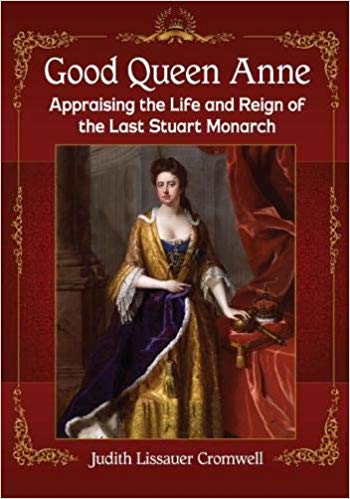
Our past shapes our present. That makes Queen Anne important
Having told the stories of two
women prominent in European history, (Dorothea
Lieven, a Russian Princess in London and Paris, 1785-1857 and Florence Nightingale, Feminist) I
wanted to write another biography about an impressive female. Queen Anne, (1665-1714) one of the few queens
who have reigned over Great Britain in their own right, came to mind – but – I
knew nothing about her. Initial research
revealed Anne to be a dim-witted, weak woman, a robot controlled by the
ambitious men around her. Was she? Getting at the truth sounded like a
challenge, and I like challenges.
women prominent in European history, (Dorothea
Lieven, a Russian Princess in London and Paris, 1785-1857 and Florence Nightingale, Feminist) I
wanted to write another biography about an impressive female. Queen Anne, (1665-1714) one of the few queens
who have reigned over Great Britain in their own right, came to mind – but – I
knew nothing about her. Initial research
revealed Anne to be a dim-witted, weak woman, a robot controlled by the
ambitious men around her. Was she? Getting at the truth sounded like a
challenge, and I like challenges.
Maligned in
several memoirs left by her best friend then bitter foe, Anne Stuart, for
decades if not centuries, was disregarded or damned with faint praise. And the men who until recently, wrote
history, chose to ignore the successes of Anne’s brief reign, (1702-1714) in
fact, a glorious reign, in which she played a key part. Queen Anne actively, consistently, and firmly
supported the historic Union of England and Scotland, which created Great
Britain; the Protestant Succession, which gave her country stability; and the
nine-year War of the Spanish Succession, then the Peace of Utrecht, which
enabled the British Empire.
several memoirs left by her best friend then bitter foe, Anne Stuart, for
decades if not centuries, was disregarded or damned with faint praise. And the men who until recently, wrote
history, chose to ignore the successes of Anne’s brief reign, (1702-1714) in
fact, a glorious reign, in which she played a key part. Queen Anne actively, consistently, and firmly
supported the historic Union of England and Scotland, which created Great
Britain; the Protestant Succession, which gave her country stability; and the
nine-year War of the Spanish Succession, then the Peace of Utrecht, which
enabled the British Empire.
A
woman “of intelligence and ambition,”* the queen showed “high virtue,
merit, and sweetness of temper.” An
accomplished musician (Anne excelled in playing the guitar) and patron of
composers, the queen liked, in the rare moments she had to herself, to listen
to her private musicians perform; she took great pleasure in planning
renovations to the gardens surrounding her several palaces; Anne loved to hunt
the fox and the stag in Windsor Great Forest; and she enjoyed horse-racing –
the queen founded Royal Ascot, which persists until this day; now, the Ascot
races open with Queen Anne’s Stakes.
woman “of intelligence and ambition,”* the queen showed “high virtue,
merit, and sweetness of temper.” An
accomplished musician (Anne excelled in playing the guitar) and patron of
composers, the queen liked, in the rare moments she had to herself, to listen
to her private musicians perform; she took great pleasure in planning
renovations to the gardens surrounding her several palaces; Anne loved to hunt
the fox and the stag in Windsor Great Forest; and she enjoyed horse-racing –
the queen founded Royal Ascot, which persists until this day; now, the Ascot
races open with Queen Anne’s Stakes.
This “excellent and pious queen”
talked in a clear melodic contralto; her “softness of
voice and sweetness of pronunciation added much life to all she spoke.” The “best mistress to servants” treated
“everyone as if they had been her equals.”
As head of the judiciary, the “kindest of queens” did not order any
political executions; she reviewed all judgments, modified sentences she
thought too harsh for the crime, and overruled a judge who had given a rapist
lenient punishment. But she refused
clemency for a highwayman who, for years, had terrorized her people.
talked in a clear melodic contralto; her “softness of
voice and sweetness of pronunciation added much life to all she spoke.” The “best mistress to servants” treated
“everyone as if they had been her equals.”
As head of the judiciary, the “kindest of queens” did not order any
political executions; she reviewed all judgments, modified sentences she
thought too harsh for the crime, and overruled a judge who had given a rapist
lenient punishment. But she refused
clemency for a highwayman who, for years, had terrorized her people.
Mother of her nation. Seventeen pregnancies failed to give Anne
Stuart the joys of motherhood for more than a heartbreakingly few years; but,
on the first day of her reign, Anne promised her people always to act in their
best interests. They, in turn, respected
Their Queen’s piety and patriotism, her sympathy for common people — shown in
her generosity — Queen Anne’s Bounty and Touching for the King’s Evil (laying
her Healing Hands on those with scrofula, not to mention giving the sufferer a
piece of Healing Gold.) Anne never
refused charity, spent no money on jewelry or new buildings. Her subjects especially admired Anne’s
private life of happy domesticity with her husband Prince George of Denmark; at
weddings, people made a habit of wishing newlyweds “to love like the queen and
prince.”
Stuart the joys of motherhood for more than a heartbreakingly few years; but,
on the first day of her reign, Anne promised her people always to act in their
best interests. They, in turn, respected
Their Queen’s piety and patriotism, her sympathy for common people — shown in
her generosity — Queen Anne’s Bounty and Touching for the King’s Evil (laying
her Healing Hands on those with scrofula, not to mention giving the sufferer a
piece of Healing Gold.) Anne never
refused charity, spent no money on jewelry or new buildings. Her subjects especially admired Anne’s
private life of happy domesticity with her husband Prince George of Denmark; at
weddings, people made a habit of wishing newlyweds “to love like the queen and
prince.”
As a
female, Anne got neither education in, nor experience of, government,
for women were held to be inferior to men, incapable of comprehending politics
or any form of business. But Anne Stuart
grew up at a decadent and intrigue-ridden court, where snakes swung from the
trees, and crocodiles slithered over slimy ground. That taught her valuable lessons about
life. During her brief reign, Anne’s
small island nation off the coast of continental Europe rose from the chaos of
civil war, regicide, and revolution to the cusp of global ascendancy mainly due
to the men she chose to lead her army and government.
female, Anne got neither education in, nor experience of, government,
for women were held to be inferior to men, incapable of comprehending politics
or any form of business. But Anne Stuart
grew up at a decadent and intrigue-ridden court, where snakes swung from the
trees, and crocodiles slithered over slimy ground. That taught her valuable lessons about
life. During her brief reign, Anne’s
small island nation off the coast of continental Europe rose from the chaos of
civil war, regicide, and revolution to the cusp of global ascendancy mainly due
to the men she chose to lead her army and government.
“Whoever of
the Whigs thinks I am to be hectored or frightened into compliance tho I am a
woman are mighty mistaken in me.”
Deploring bitter party conflict because she thought it weakened her
nation, the conscientious and hard-working queen governed via Moderation. She filled her cabinet and administration
with men from the Whig and Tory parties, thus keeping the crown independent.
the Whigs thinks I am to be hectored or frightened into compliance tho I am a
woman are mighty mistaken in me.”
Deploring bitter party conflict because she thought it weakened her
nation, the conscientious and hard-working queen governed via Moderation. She filled her cabinet and administration
with men from the Whig and Tory parties, thus keeping the crown independent.
Neither
brilliant, charismatic, nor beautiful, battling poor health and the
contemporary notion that females were the weaker sex, Anne Stuart had grit, a decent heart and a practical outlook on life. Strong awareness of duty, as well as
common sense, made her an astute head of state, deftly navigating the
treacherous shoals of power politics and party polarity to become the unifying and stabilizing force in
her divided country.
brilliant, charismatic, nor beautiful, battling poor health and the
contemporary notion that females were the weaker sex, Anne Stuart had grit, a decent heart and a practical outlook on life. Strong awareness of duty, as well as
common sense, made her an astute head of state, deftly navigating the
treacherous shoals of power politics and party polarity to become the unifying and stabilizing force in
her divided country.
In the “Me Too” era, when so many women of all ages and
backgrounds seek fulfillment, Anne Stuart inspires. Because she proved how an average female
overcame personal tragedy, physical debility, and the perceived
limitations of her sex to become a beloved and effective queen.
backgrounds seek fulfillment, Anne Stuart inspires. Because she proved how an average female
overcame personal tragedy, physical debility, and the perceived
limitations of her sex to become a beloved and effective queen.
* All quotes are taken from contemporary accounts.
—-
Thank you to author Judith Cromwell for her special guest post today! Readers, be sure to purchase your copy of the book Good Queen Anne, now available on Amazon or add it to your Goodreads list.
—

Judith
Lissauer Cromwell spent a successful corporate career on Wall Street
before returning to academia as an independent historian and biographer of
powerful women. She previously published Dorothea Lieven: A Russian Princess in
London and Paris 1785-1857 and Florence Nightingale, Feminist, and now tells
the real story of Queen Anne in her latest book, Good Queen Anne: Appraising
the Life and Reign of the Last Stuart Monarch. Today she brings her perspective
on the meticulous research involved in writing about these impressive women.
Lissauer Cromwell spent a successful corporate career on Wall Street
before returning to academia as an independent historian and biographer of
powerful women. She previously published Dorothea Lieven: A Russian Princess in
London and Paris 1785-1857 and Florence Nightingale, Feminist, and now tells
the real story of Queen Anne in her latest book, Good Queen Anne: Appraising
the Life and Reign of the Last Stuart Monarch. Today she brings her perspective
on the meticulous research involved in writing about these impressive women.





I find the monarchy of the past fascinating.
Thanks for featuring her!